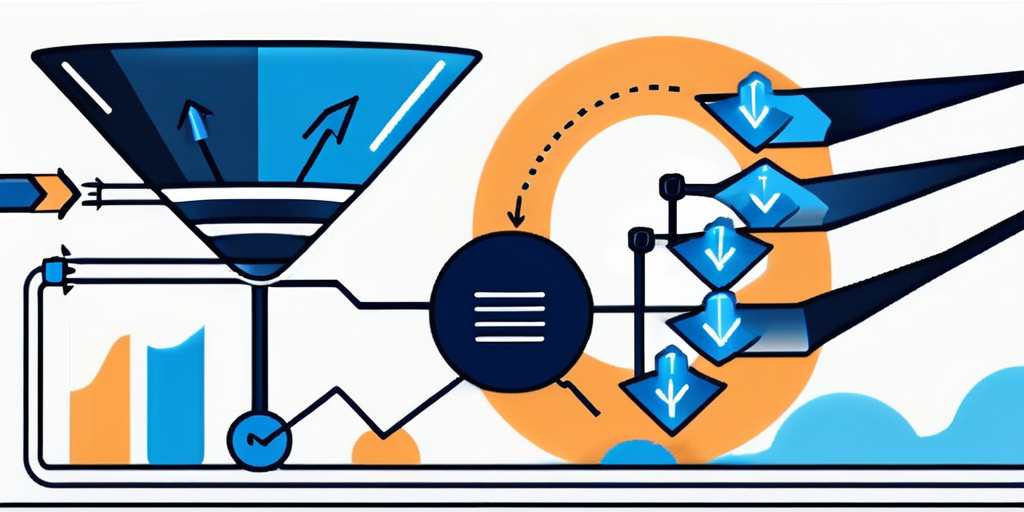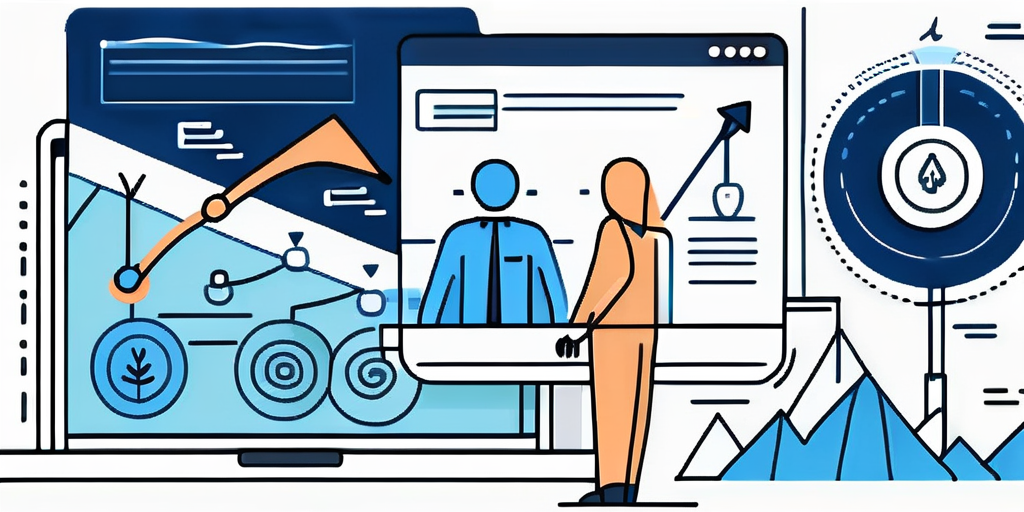The sales funnel is a fundamental concept in sales and marketing that provides a visual representation of the customer journey. It illustrates the path that potential customers take from their first interaction with your brand to the final purchase or conversion. This article will delve into the intricate details of the sales funnel, with a special focus on website leads.
Website leads are potential customers who have shown interest in your product or service by providing their contact information through your website. They are a critical component of the sales funnel, acting as the bridge between the awareness and consideration stages. Understanding how to effectively manage and qualify these leads can significantly improve your conversion rates and overall business performance.
Understanding Sales Funnel Qualification
The sales funnel, also known as the purchase funnel or customer funnel, is a model that outlines the theoretical customer journey towards the purchase of a product or service. It is divided into several stages, each representing a different phase of the customer’s decision-making process. These stages are typically categorized as awareness, interest, consideration, intent, evaluation, and purchase.

While the sales funnel may seem straightforward, it is a complex and dynamic process that requires careful management and optimization. Each stage of the funnel presents unique challenges and opportunities, and understanding these can help businesses create more effective marketing strategies and improve their conversion rates.
The Stages of the Sales Funnel
The first stage of the sales funnel is the awareness stage. This is when potential customers first become aware of your product or service. At this stage, the goal is to capture the attention of your target audience and generate interest in your offering.
The next stage is the interest stage, where potential customers begin to show interest in your product or service. This is often where website leads come into play, as they are typically generated through online marketing efforts such as content marketing, social media marketing, and search engine optimization.
The Role of Website Leads in the Sales Funnel
Website leads play a crucial role in the sales funnel. They represent potential customers who have shown enough interest in your product or service to provide their contact information. This information can then be used to nurture these leads through the rest of the sales funnel, ultimately leading to a purchase.
However, not all website leads are created equal. It’s important to qualify these leads to ensure that they are a good fit for your product or service. This can be done through a variety of methods, including lead scoring, behavioral analysis, and direct communication.
Qualifying Website Leads
Qualifying leads is a critical step in the sales process. It involves determining whether a lead is likely to become a customer based on various factors such as their behavior, demographics, and level of engagement with your brand. By qualifying leads, businesses can focus their efforts on the most promising prospects, thereby improving efficiency and increasing conversion rates.
There are several methods for qualifying leads, including BANT (Budget, Authority, Need, Timing), CHAMP (Challenges, Authority, Money, Prioritization), and GPCT (Goals, Plans, Challenges, Timeline). Each of these methods has its own strengths and weaknesses, and the best choice will depend on your specific business needs and circumstances.
Lead Scoring
Lead scoring is a quantitative method for qualifying leads. It involves assigning a numerical value to each lead based on various factors such as their behavior, demographics, and level of engagement with your brand. The higher the score, the more likely the lead is to become a customer.
Lead scoring can be an effective way to prioritize your leads and ensure that your sales team is focusing their efforts on the most promising prospects. However, it requires a thorough understanding of your target audience and a well-defined scoring system.
Behavioral Analysis
Behavioral analysis is another method for qualifying leads. It involves analyzing a lead’s behavior to determine their level of interest in your product or service. This can include actions such as visiting your website, downloading content, or interacting with your brand on social media.
By understanding a lead’s behavior, businesses can gain valuable insights into their interests and needs, allowing them to tailor their marketing efforts accordingly. However, behavioral analysis requires sophisticated tracking tools and a deep understanding of customer behavior.
Managing and Nurturing Website Leads
Once you have qualified your website leads, the next step is to manage and nurture them through the rest of the sales funnel. This involves maintaining regular contact with the leads, providing them with valuable content, and addressing any concerns or objections they may have.

Lead nurturing is a critical component of the sales process. It allows businesses to build relationships with their leads, establish trust, and gradually guide them towards a purchase. However, it requires a strategic approach and a deep understanding of your leads’ needs and preferences.
Email Marketing
Email marketing is one of the most effective methods for nurturing leads. It allows businesses to maintain regular contact with their leads, provide them with valuable content, and gradually guide them towards a purchase. However, it requires a strategic approach and a deep understanding of your leads’ needs and preferences.
Successful email marketing involves more than just sending out mass emails. It requires a targeted approach, with personalized messages that address the specific needs and interests of each lead. This can be achieved through segmentation, personalization, and automation.
Content Marketing
Content marketing is another effective method for nurturing leads. It involves creating and sharing valuable content that is relevant to your leads’ interests and needs. This can include blog posts, white papers, ebooks, webinars, and more.
By providing your leads with valuable content, you can establish your brand as a trusted authority in your field, build relationships with your leads, and gradually guide them towards a purchase. However, content marketing requires a strategic approach and a deep understanding of your leads’ needs and preferences.
Conclusion
The sales funnel is a complex and dynamic process that requires careful management and optimization. Website leads play a crucial role in this process, acting as the bridge between the awareness and consideration stages. By understanding how to effectively manage and qualify these leads, businesses can significantly improve their conversion rates and overall business performance.

However, it’s important to remember that not all website leads are created equal. Qualifying these leads is a critical step in the sales process, and it requires a thorough understanding of your target audience and a well-defined qualification process. By focusing your efforts on the most promising prospects, you can improve efficiency, increase conversion rates, and ultimately drive business growth.
Frequently Asked Questions
What is Sales Funnel Qualification?
Sales funnel qualification refers to the process of assessing and categorizing leads or prospects at various stages of the sales funnel based on their likelihood to make a purchase. It involves determining which leads are merely interested in information, which ones are considering a purchase, and which are ready to buy. This process helps sales teams focus their efforts on leads that are most likely to convert into paying customers.
What are the key stages in Sales Funnel Qualification?
The key stages in sales funnel qualification typically include:
- Awareness: Identifying leads who are just becoming aware of a problem or need.
- Interest: Separating out leads who show interest in finding a solution.
- Consideration: Qualifying leads who are actively considering your product or service as their solution.
- Intent: Identifying leads who have a clear intent to purchase.
- Evaluation: Assessing leads who are comparing your offering against others.
- Purchase: Recognizing leads who are ready to make a buying decision.
Why is Sales Funnel Qualification important?
Sales funnel qualification is important because it:
- Improves Efficiency: Enables sales teams to prioritize their time and resources on leads most likely to convert, thus improving sales efficiency.
- Enhances Effectiveness: Tailors communication and nurturing efforts to match the specific needs and readiness of leads at different stages, enhancing the effectiveness of sales strategies.
- Increases Conversion Rates: By focusing on more qualified leads, businesses can increase their conversion rates and achieve better sales outcomes.
- Reduces Costs: Streamlines the sales process by reducing time and effort spent on leads less likely to result in sales, ultimately reducing customer acquisition costs.
How can businesses qualify leads in the Sales Funnel?
Businesses can qualify leads in the sales funnel using techniques such as:
- BANT Criteria: Evaluating leads based on their Budget, Authority, Need, and Timeline to purchase.
- Lead Scoring: Assigning scores to leads based on their actions, engagement level, and demographic information to gauge their sales readiness.
- Direct Engagement: Interacting directly with leads through calls, emails, or meetings to assess their interest and readiness to buy.
- Behavioral Analysis: Analyzing leads’ behaviors, such as website visits, content downloads, and email interactions, to infer their stage in the buying process.
What strategies can improve Sales Funnel Qualification?
Strategies to improve sales funnel qualification include:
- Regular Review and Adjustment: Continuously reviewing and refining qualification criteria to align with changing market conditions and customer behaviors.
- Integrated CRM and Marketing Automation: Utilizing CRM and marketing automation tools to capture and analyze lead data more effectively for qualification purposes.
- Educational Content: Providing valuable content that addresses the questions and needs of leads at different funnel stages to facilitate their progression.
- Training and Alignment: Ensuring sales and marketing teams are well-trained and aligned on qualification criteria and processes to improve overall efficiency and effectiveness.
- Feedback Loops: Establishing feedback loops between sales, marketing, and customer service teams to share insights about lead quality and funnel progression.